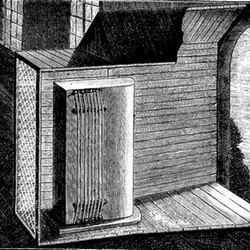
Schubert musicalized Johann Georg Jacobi's poems seven times; Five songs are from August 1816, one more from September that year. Although we are not entirely sure, Litanei was probably written in those same dates, according to two reasons. The first one is that, in that long year of miracles, Schubert used to "explore" a poet and write a series of songs with his poems; The second one is that this Lied was included in "Therese Songbook". Do you remember Therese Grob? She was Schubert's first love (thanks to her we can enjoy Gretchen am Spinnrade) and it seems they had a relationship for a couple of years. Therese's birthday was on November 16 and, in 1816, Schubert's gift was that songbook, including sixteen of his Lieder; Therefore, Litanei auf das Fest Aller Seelen had to be necessarily composed before that date.
Jacobi's poem is, as its name suggests, a litany, a series of invocations for all the souls that left this world; In nine stanzas, he details their circumstances: they died soon after their birth, young or old; suffering or peacefully; either those who encountered friends and love during their lives and those who didn't; those who died for the truth and those who lived bravely. And all invocations always end with the same words: "all souls rest in peace". Schubert wrote a pure strophic song with this poem and didn't clarify how many and which stanzas he chose, besides the first one. The song was published in 1831 with three stanzas: first, third and sixth. The Peters edition follows the same criteria, while the Gesamtausgabe (edited between 1884 and 1887) includes all nine verses because Schubert didn't indicate his. That is, the performers chose which stanzas they sing (something similar happens with Liebhaber in allen Gestalten).
Dietrich Fischer-Dieskau considered this Lied as one of the most difficult for singers and he recommended not to sing more than two stanzas, because the effect of the melody, these calm and sweetness, could become affected by excessive repetition. A quick review of the recorded versions (you can find all of them on Spotify) show that most singers choose to sing the three stanzas in the first edition. The chosen tempo can be very different; most of the versions last around 5 minutes, but they go from the nervous 4'16'' of Camilla Tilling to the very slow 7'54'' of Matthias Goerne. Some singers also sing three stanzas, but different ones: Florian Boesch chooses the first, fifth and seventh, and Ian Bostridge first, sixth and eighth. I have only found two versions with just two stanzas: that of Fischer-Dieskau and the one I had already selected for today, with Bryn Terfel and Malcolm Martineau, who perform the first and sixth ones. I'm sharing here just the text of these two stanzas, but in this link to lieder.net, Emily Ezust's webpage, you'll find the whole poem and its translation. Now, please, listen to this gorgeous song.
Ruh’n in Frieden alle Seelen,
Die vollbracht ein banges Quälen,
Die vollendet süßen Traum,
Lebenssatt, geboren kaum,
Aus der Welt hinüberschieden:
Alle Seelen ruhn in Frieden!
Und die nie der Sonne lachten,
Unterm Mond auf Dornen wachten,
Gott, in reinen Himmelslicht,
Einst zu sehn von Angesicht:
Alle die von hinnen schieden,
Alle Seelen ruhn in Frieden!
Rest in peace, all souls
who have had done with anxious torment,
who have had done with sweet dreams
who, sated with life and hardly born,
have departed from this world:
all souls rest in peace!
And those who never smiled at the sun,
keeping watch on the thorns beneath the moon,
to see God in the pure heavenly light
and look him just once in the face:
all who have parted from here,
all souls rest in peace!
(translation by Emily Ezust)




 Ther...
Ther...











Comments powered by CComment